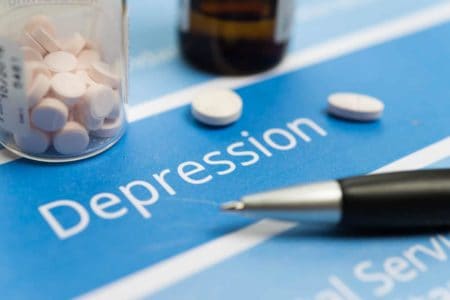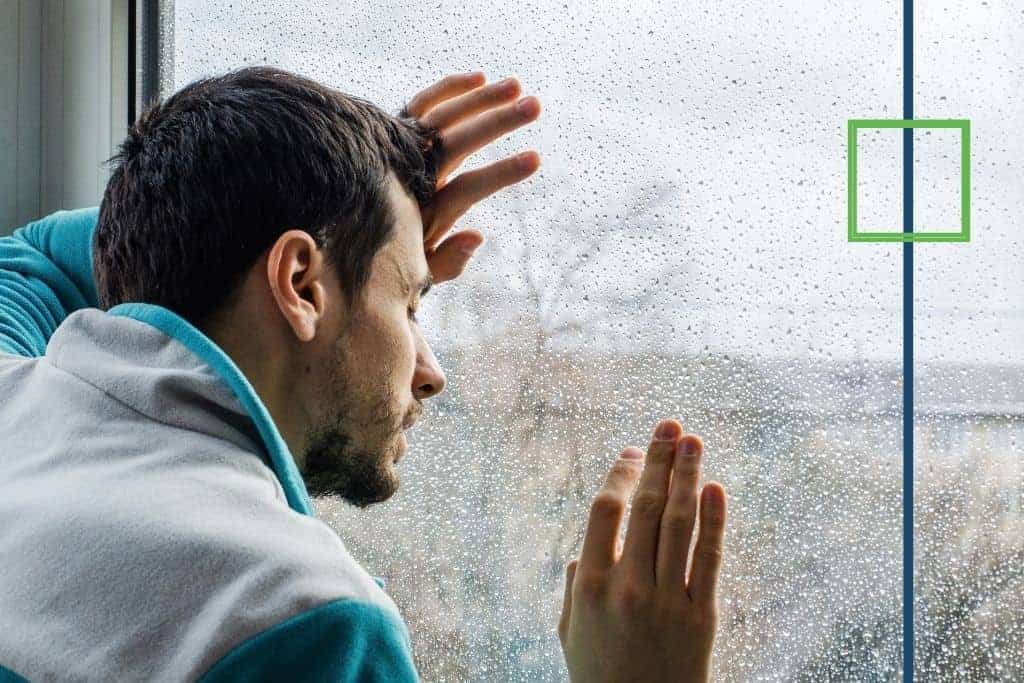What Are Benzos?
Benzodiazepines also referred to as benzos, are among the most widely prescribed drug classes in the United States. Benzodiazepines are a class of psychoactive drugs known for their depressant effect on the central nervous system (CNS) [1]. Related to their rapid onset and immediate symptom relief. Benzodiazepines are used for those struggling with sleep, anxiety, spasticity due to CNS pathology, muscle relaxation, and epilepsy. While not typically an indicated use, benzodiazepines for depression have become more common.
One of the debilitating side effects of benzodiazepines is their addictive potential. The dependence on this drug generally leads to benzodiazepine withdrawal symptoms. Regular use of these drugs has been shown to cause severe, harmful psychological and physical dependence, leading to withdrawal symptoms similar to that of alcohol withdrawal.

Benzodiazepines, discovered in the early 1960s, are still a mainstay in the treatment of anxiety disorders. Anxiety disorders are a group of conditions that includes generalized anxiety disorder (GAD), social anxiety disorder (also called social phobia), panic disorder, posttraumatic stress disorder (PTSD), obsessive-compulsive disorder (OCD), and phobias. These disorders are common, and the cost of anxiety disorders in the United States has been estimated at over $64.5 billion per year.
In the United States, benzodiazepines approved for the treatment of anxiety disorders include alprazolam (sold under the brand name Xanax), chlordiazepoxide (Librium), and clonazepam (Klonopin), clorazepate (Tranxene), diazepam (Valium), lorazepam (Ativan), and oxazepam (Serax). Anxiety can be treated with benzodiazepines alone or in conjunction with other medications, including antidepressants, such as selective serotonin reuptake inhibitors (SSRIs) and serotonin and norepinephrine reuptake inhibitors (SNRIs), antipsychotic agents, and mood stabilizers.
Get Help. Get Better. Get Your Life Back.
Searching for Accredited Drug and Alcohol Rehab Centers Near You?
Even if you have failed previously and relapsed, or are in the middle of a difficult crisis, we stand ready to support you. Our trusted behavioral health specialists will not give up on you. When you feel ready or just want someone to speak to about therapy alternatives to change your life call us. Even if we cannot assist you, we will lead you to wherever you can get support. There is no obligation. Call our hotline today.
(844) 597-1011Can Benzos Cause Depression?
Depression or major depressive disorder is a mental health condition characterized by a loss of interest in activities or a depressed mood. Depression can interfere with a person’s life, specifically their ability to perform at work, socialize, and maintain interpersonal relationships. This mental health condition has a variety of causes, ranging from genetics to chemical imbalance. However, another common cause of depression is substance abuse. Benzos are central nervous system depressants or tranquilizers that have been associated with depression. But can benzos cause depression?
When benzodiazepines are abused, they can produce a sedative and euphoric high. Because of their ability to relax you, they’re also highly addictive. Long-term benzo abuse is believed to not only cause addiction but also cause if not contribute to mental illnesses like depression. Otherwise referred to as a co-occurring disorder, people with benzo addiction and mental illness usually need dual diagnosis treatment to recover psychologically and physically.
When examining the relationship between benzodiazepines and depression, a specific correlation between benzo abuse and depression hasn’t been identified. However, anhedonia – or loss of pleasure – is a common side effect of benzo addiction, which may worsen depression symptoms. Benzos can cause depression in people with a predisposition to or a history of depression and can also cause depressive episodes or worsen symptoms in individuals with this condition.
Depression often presents with anxiety. The rate of anxiety comorbidity among patients with depression varies between 33% to 85 %. While benzodiazepines won’t treat depression, they’re sometimes prescribed alongside antidepressants for people who suffer from co-occurring anxiety disorders and depressive disorders. According to the National Center for Biotechnology Information (NCBI), benzodiazepine toxicity states that although depression is not a frequent side effect, “Benzodiazepines have been reported to cause or exacerbate symptoms of depression”. In a standard pharmacologic textbook, depression is noted to be an occasional side effect of benzodiazepine use.
Are Benzos Depressants?
What are depressants? Sometimes called “downers,” these drugs come in multicolored tablets and capsules or in liquid form. Some drugs in this category, such as Zyprexa, Seroquel, and Haldol, are known as “major tranquilizers” or “antipsychotics,” as they are supposed to reduce the symptoms of mental illness. Depressants such as Xanax, Klonopin, Halcion, and Librium are often referred to as “benzos”. Other depressants, such as Amytal, Numbutal, and Seconal, are classed as barbiturates—drugs that are used as sedatives and sleeping pills.

Depressant substances reduce arousal and stimulation. They do not necessarily make a person feel depressed. They affect the central nervous system, slowing down the messages between the brain and the body. They can affect concentration and coordination. They slow down a person’s ability to respond to unexpected situations. In small doses, they can cause a person to feel more relaxed and less inhibited. In larger doses, they can cause drowsiness, vomiting, unconsciousness, and death.
Usage depends on the specific type of depressant, for example, alcohol is drunk but benzodiazepines are usually swallowed and can also be injected. Generally, depressants can be swallowed, drunk as a beverage, injected, snorted, or inhaled. According to DEA, benzodiazepines are depressants that produce sedation and hypnosis, relieve anxiety and muscle spasms, and reduce seizures. Benzodiazepines are central nervous system depressants, which means they slow down the workings of the brain. They only treat symptoms of anxiety or insomnia and do not solve the underlying causes of these conditions.

Get Your Life Back
Find Hope & Recovery. Get Safe Comfortable Detox, Addiction Rehab & Dual Diagnosis High-Quality Care.
Hotline(844) 597-1011What Are The Risks of Taking Benzos for Anxiety?
A person on long-term benzodiazepine therapy for their anxiety will develop tolerance and dependence, requiring ever-increasing dosages to maintain the same effects. If they have been maintained on a stable dosage regimen for a prolonged period, benzodiazepines may be doing nothing for their anxiety or actually increasing it. Further, benzodiazepine can be the cause of the anxiety being experienced.
These drugs, especially when mixed with other prescription drugs, can cause over-sedation or respiratory depression resulting in a risk of overdose. Evidence is accumulating that chronic use of benzos is linked with cognitive impairment, depression, and an increased incidence of developing dementia. Discontinuation of benzos must be done carefully because patients can develop severe withdrawal symptoms such as seizures which can be life-threatening,
A clinical diagnosis of an anxiety disorder can be debilitating and affect a person for their entire life. It is important to realize that anxiety-related problems are not cured or solved by medication like a benzodiazepine. As an alternative to benzodiazepines, there are non-addictive anxiety medications, specific psychotherapies, such as cognitive behavior therapy, emotional freedom techniques, EMDR therapy, and holistic therapies that target anxiety and help people regain control of their life and improve their well-being.
Benzo Withdrawal Depression
The physical dependence on benzos can happen after relatively short periods of use. When stopping the use of benzodiazepines, whether they have been taken as prescribed or not, withdrawal is likely. Some people may experience post-acute withdrawal syndrome when stopping the use of benzodiazepines. This may last for several months after discontinuing use.
People experiencing long-term effects from withdrawal should seek professional assistance to ensure setbacks are avoided. Benzodiazepine withdrawal depression poses a significant risk for setbacks because it can seem appealing to return to using benzodiazepines if someone is withdrawing without medical assistance. However, by remaining abstinent and working through post-acute withdrawal syndrome in a treatment facility or hospital, long-term recovery is possible.
Withdrawal symptoms may be mild in people who take the drugs for short periods. However, there is still a possibility of severe reactions and withdrawal symptoms.
Although not everyone will experience the same symptoms, some are more common. These include:
- Physical aches and pains that can range from uncomfortable to severe
- Abnormal sensations, such as the feeling that bugs are crawling on the skin
- Muscle spasms
- Vomiting
- Anorexia
- Hyperventilation
- Sweating
- Weight loss
- Anxiety attacks
- Trouble concentrating
- Hypersensitivity
- Nausea
- Depression
- Insomnia
- Panic attacks
- Grand mal seizures
- Detachment from reality
- Hallucinations or delusions
First-class Facilities & Amenities
World-class High-Quality Addiction & Mental Health Rehabilitation Treatment
Rehab Centers TourRenowned Addiction Centers. Serene Private Facilities. Inpatient rehab programs vary.
Addiction Helpline(844) 597-1011Proven recovery success experience, backed by a Team w/ History of:
15+
Years of Unified Experience
100s
5-Star Reviews Across Our Centers
10K
Recovery Success Stories Across Our Network
- Low Patient to Therapist Ratio
- Onsite Medical Detox Center
- Comprehensive Dual-Diagnosis Treatment
- Complimentary Family & Alumni Programs
- Coaching, Recovery & Personal Development Events
Benzo Withdrawal Severe Depression
Is withdrawal from these drugs deadly? It absolutely can be. An individual could experience severe depressive symptoms that may cause them to act out or hurt themselves. In addition, the psychosis that does sometimes result from benzodiazepine withdrawal can cause the individual to become a danger to themselves and others. Seizures can also be extremely dangerous, especially for those who have never experienced them before and have no idea how to treat them. Finally, someone can become very hurt due to the behavioral and even the physical symptoms caused by their withdrawal.
People struggling with benzo addiction should not attempt to stop taking them on their own. Benzodiazepine withdrawal symptoms can be uncomfortable and––in the case of certain CNS depressants––potentially life-threatening. Therefore, professional dual diagnosis treatment is necessary for a safe recovery.

Benzo Addiction
Benzo addiction is a growing public health problem, with increases in benzodiazepine-related overdose deaths and emergency room visits in recent years. In 2017, benzodiazepines and other tranquilizers were the third most commonly used illicit or prescription drug in the U.S. (approximately 2.2% of the population), with more than 1 in 20 people in the U.S. filling a prescription each year.
The proportion of people with an opioid analgesic prescription who were also prescribed a benzodiazepine increased by 41% from 2002 to 2014, despite evidence that concomitant opioid and benzodiazepine prescriptions increase the risk of overdose. The data also showed that most misusers obtained benzodiazepines from friends or relatives, with only about 20% receiving them from their doctor.
The addictive power of benzos was similar to that of opioids, cannabinoids, and GHB – all substances with exceptionally strong addictive qualities. When you take a benzo, your dopamine levels surge, which floods your brain with the feel-good neurotransmitter. This sudden, strong wave of pleasure is understandably rewarding and, to some, can prove irresistible.
World-class, Accredited, 5-Star Reviewed, Effective Addiction & Mental Health Programs. Complete Behavioral Health Inpatient Rehab, Detox plus Co-occuring Disorders Therapy.
CALL(844) 597-1011End the Addiction Pain. End the Emotional Rollercoaster. Get Your Life Back. Start Drug, Alcohol & Dual Diagnosis Mental Health Treatment Now. Get Free No-obligation Guidance by Substance Abuse Specialists Who Understand Addiction & Mental Health Recovery & Know How to Help.
Dual Diagnosis Treatment for Benzos and Depression Problems
There is a strong link between mental health conditions, such as depression and anxiety disorder and benzo addiction. Individuals who struggle with mood disorders like depression and anxiety are more susceptible to developing an addiction to drugs and alcohol, often to self-medicate symptoms of their underlying mental health condition. These co-occurring disorders can make each other worse without proper treatment.
To determine the most effective ways to treat benzos for anxiety and depression that lead to prescription drug abuse problems, it’s crucial to first get an accurate assessment of all the symptoms. When the symptoms of benzos and depression problems have been evaluated by a mental health professional, it may be determined that another form of mental condition is present and needs a particular type of treatment. Very often, some combination of psychotherapy, medication, and/or lifestyle changes are effective for coping with functional.
Medically-Assisted Detox
Medical detox is often considered the first stage of treatment. It will help you navigate the complicated process of withdrawal, but it doesn’t address patterns of thought and behavior that contribute to drug abuse. Various treatment approaches and settings can help provide the ongoing support necessary to maintain long-term sobriety after you complete detox.
Cravings are very common during detox and can be challenging to overcome. This often leads to relapse. Constant medical care provided during inpatient drug rehab helps prevent relapse. Clinicians can provide necessary medication and medical expertise to lessen cravings and the effects of withdrawals.
Psychotherapy for Depression and Anxiety
Several different modalities of psychotherapy have been used in the treatment of depression including:
- Cognitive Behavioral Therapy (CBT) – is an effective treatment that involves making changes in both the patterns of negative thoughts and the behavioral routines which are affecting the daily life of the depressed person for various forms of depression.
- Dialectical Behavioral Therapy – is a comprehensive mental health and substance abuse treatment program whose ultimate goal is to aid patients in their efforts to build a life worth living. The main goal of DBT is to help a person develop what is referred to as a “clear mind.”
- Person-Centered Therapy – is a strategy that allows and encourages clients to understand and resolve their concerns in a safe, supportive environment.
- Solution Focused Therapy – is an approach interested in solutions that can be quickly implemented with a simple first step leading to further positive consequences.
Dual Diagnosis Treatment
Substance abuse and mental health disorders often co-occur. In many cases, traumatic experiences can result in a mental health disorder and substance abuse. Dual diagnosis rehabilitation treats both of these issues together. The best approach for the treatment of dual diagnosis is an integrated system. In this strategy, both the substance abuse problem and the mental disorder are treated simultaneously. Regardless of which diagnosis (mental health or substance abuse problem) came first, long-term recovery will depend largely on the treatment for both disorders done by the same team or provider.
Medication-Assisted Treatments
Medication-Assisted Treatments (MAT) for substance use disorders and mental health disorders are commonly used in conjunction with one another. This includes the use of medications and other medical procedures. During your rehab, the staff from your treatment facility will help you identify what caused your addiction and teach you skills that will help you change your behavior patterns and challenge the negative thoughts that led to your addiction. Sometimes, the pressures and problems in your life lead you to rely on substances to help you forget about them momentarily.
Xanax is a benzodiazepine that comes in either tablet or capsule form. Someone with a Xanax addiction may take up to 20 or 30 pills per day. If the user decides to stop the Xanax dosages, they may experience withdrawal effects such as anxiety, restlessness, insomnia, and tremors. The development of tolerance and withdrawal are indications of benzo addiction. If you or a loved one are struggling with long-term alcohol and anxiety problems, contact one of our helpful treatment specialists today. We Level Up can provide information on dual diagnosis and detox programs that may fit your

Experience Transformative Recovery at We Level Up Treatment Centers.
See our authentic success stories. Get inspired. Get the help you deserve.
Start a New Life
Begin with a free call to an addiction & behavioral health treatment advisor. Learn more about our dual-diagnosis programs. The We Level Up Treatment Center Network delivers recovery programs that vary by each treatment facility. Call to learn more.
- Personalized Care
- Caring Accountable Staff
- World-class Amenities
- Licensed & Accredited
- Renowned w/ 100s 5-Star Reviews
We’ll Call You
Sources:
[1] NCBI – https://www.ncbi.nlm.nih.gov/pmc/articles/PMC8629021/
[2] NCBI – https://www.ncbi.nlm.nih.gov/books/NBK470159/
[3] NCBI – https://www.ncbi.nlm.nih.gov/pmc/articles/PMC1463500/
[4] Benzo Addiction – We Level Up NJ


